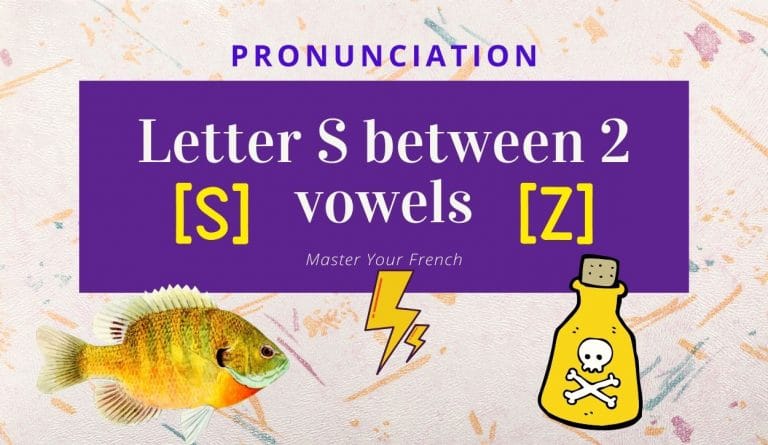When does S sound like Z in French?
Updated: June 10, 2023 by Mylene in Pronunciation LessonsArray ▪

Have you ever wondered how to pronounce the letter S in French? The letter S has 2 pronunciations in the middle of a word, and there are rules around this. In this article, you’ll learn how to pronounce the letter S between two vowels in French. You’ll also discover words that have similar spellings but different meanings. A single S or a double SS can change the meaning of a word!
Throughout this post, you will learn about the different ways to pronounce the letter S:
- In the middle of a word
- The right way to pronounce S (a video)
- Similar words but different meanings
- Pronunciation exceptions with the letter S
How to pronounce S in the middle of a word?
When the consonant S is between two vowels (oral vowel or nasal vowel).
The letter S is pronounced /z/ such as valise, pronounced /valiz/, or oiseau, pronounced /wazo/.
You must pronounce the voiced consonant /z/. For this, you need to use your vocal cords.
To break the /z/ sound in French words, the rule is to add a double SS.
For example, words like “tasse” or “classe” have a double SS and therefore are pronounced with the sound /s/ :
- tasse is pronounced /tas/
- classe is pronounced /klas/
You must pronounce the unvoiced consonant /s/. For this you don’t have to use your vocal cords.
Of course, there are other cases where the letter S is pronounced as /z/.
Master Your French blog covers a wide range of topics related to French pronunciation, listening, culture, and much more. Among many articles, you can learn about French silent letters, such as the silent h. This article is about the specific case when the letter S is between two vowels.
Watch the right way to pronounce S in French
In the video below, I show you different examples where the consonant S is pronounced as /s/ and other examples where the letter S is pronounced as /z/.
In addition, discover similar words that have different meanings when having a single S or double S. This is how you’ll learn how to pronounce the letter S correctly in words like “poison” and “poisson”, “désert” and “dessert”.
Click to watch this video The Right Way To Pronounce S in French: 5 Similar Words But Different Meanings.
Be sure to watch the video to learn more about the pronunciation of the letter S. To follow more updates, subscribe to the YouTube channel.
Similar words but different meanings
French words like “masque” and “chaussure” are pronounced with the oral consonant /s/ while other words such as “valise” and “vase” are pronounced with the oral consonant /z/ :
- masque is pronounced /mask/
- chaussure is pronounced /ʃosyʁ/
- valise is pronounced /valiz/
- vase is pronounced /vaz/
In the following, you’ll find a list of words that have similar spelling, but their meaning is very different. In terms of spelling, every pair of words has one word with a single S and another word with a double SS. If you’re interested in learning more about the pronunciation of double letters in French, here’s an article where you can learn about consonant doubling in French phonetic.
Cousin vs. Coussin
The word cousin in French refers to a child of one’s uncle or aunt. It has the same meaning in English as in French. In addition, the pronunciation of the letter S in French is similar to how it is pronounced in English.
In the word “cousin”:
- the letter S is between two vowels, the U and the I
- the S in “cousin” is pronounced as a /z/ sound
In French, there is a word that has its spelling very similar to “cousin”. It is the word “coussin”. While both words share many common letters, their meaning is totally different. In fact, “coussin” means pillow.
In terms of spelling, the difference between the word “coussin” and “cousin” is that:
- “coussin” is written with a double SS
- as a result, the word “coussin” is pronounced with an /s/ sound


Désert vs. Dessert
Another pair of words in French that have their spelling similar is “désert” and “dessert”. The word “désert” means the desert. As for “dessert” it means dessert in English.
Let’s take the sentence: “Je mange un dessert dans le désert” (I eat a dessert in the desert). You can spot the two words “dessert” and “désert ” in this sentence.
In terms of pronunciation, the S in the word “désert” is pronounced as a /z/ sound because the letter S is between two vowels (E).
On the other hand, “dessert” has a double SS which results in the phonetic sound /s/.


Ruse vs. Russe
The word “ruse” in French refers to cunning, a cunning fox. If we take the word “Russe”, which means Russian, it is clear that both words are similar in terms of spelling.
Here is one sentence that has both words: Ce Russe ruse (this cunning Russian). This is another situation where the letter S in “ruse” is between two vowels, the U and the E.
The word “Russe” has a double SS which means that the pronunciation of “Russe” is with the sound /s/. Of course, “ruse” is pronounced with the sound /z/.


Poison vs. Poisson
Let’s now take a well-known example with the words “poisson” and “poison”. While the word “poisson” means fish, the word “poison” also means poison in English.
The only difference between “poisson” and “poison” is that the former word has a double SS while the latter has a single S. As we saw in the previous example, whenever an S is between two vowels it must be pronounced as /z/. This is the case of “poison”. To make a /s/ sound, a word should have a double SS. It is the case of the word “poisson”. So be sure to write “poisson” with a double SS; otherwise, you’ll be referring to poison!
Lisent vs. Lissent
The last example in which a single S between two vowels is pronounced /z/ is the word “lisent”:
- The word “lisent” is the French verb “lire” (to read) conjugated to the present tense in plural.
- “Lisent” is very close in terms of spelling to “Lissent” which means to smooth in English.
Now, you know that “lisent” is pronounced with /z/ while “lissent” is pronounced with the sound /s/.
In this section, we elaborated on words that sound similar in French, but similar words can also be found in other languages. We refer to these words as cognates, as they are identical or akin words that exist in two distinct languages, such as the following list of words that are identical in French and English.
Pronunciation and exceptions with the letter S
There are some words that are written with a single S but are pronounced with the sound /s/. Here are some of the exceptions.
Exception 1: After the prefix “R”
The word “resaler” has a single S but this s is pronounced as /s/ (not as /z/). Resaler means to add more salt.
Other examples with the prefix “re“ :
- resalir is pronounced /ʁəsaliʁ/ which means to get dirty again
- resaluer is pronounced /ʁəsalɥe/ which means to say hi again
Exception 2: After the prefix “A”
“Asymétrie” is pronounced with an /s/ regardless of having the letter S between two vowels. Asymmetry is the meaning of “asymétrie” in English.
Exception 3: After the prefix “Para”
After the prefix “para”, the letter S is pronounced as /s/ even if it is located between two vowels. Here is one example “parasol” (beach umbrella).
Unlock your potential with our pronunciation course
The pronunciation of ‘S’ in French can indeed vary depending on many factors, such as its position in a word, the word’s preceding and following letters, as well as other variations. In this article, we focused on the pronunciation of the letter S when it’s between two vowels. The key to mastering the pronunciation of the letter ‘S’ in French lies in understanding these variations and practicing them in different contexts. Here’s where our flexible online French pronunciation course can help you tackle this. It provides you with comprehensive pronunciation guides and offers in-depth lessons, meticulously prepared to teach you the individual sounds in French, including the variations of the letter ‘S’.
Experience the myriad benefits once you choose to subscribe to our online courses. Our online pronunciation course lets you study at your own pace. Spend more time on challenging sounds and breeze through areas they’ve already mastered, ensuring a more effective learning experience. Master your French pronunciation by tailoring your learning time around your daily routines and commitments. Our online courses provide a mix of learning materials, such as video lessons, audio clips, and interactive quizzes, catering to different learning styles. Throughout your French language-learning journey, this collection of resources will keep you engaged and motivated.
This post is also available in Français.



What about the name : Alisa ? Would you pronounce it as a /z/ or a /s/ ?
Bonjour Eugenie,
This is a great question!
The letter s is between 2 vowels, so it should be pronounced /z/.
But there are no rules for pronouncing proper nouns in French.
Mylène